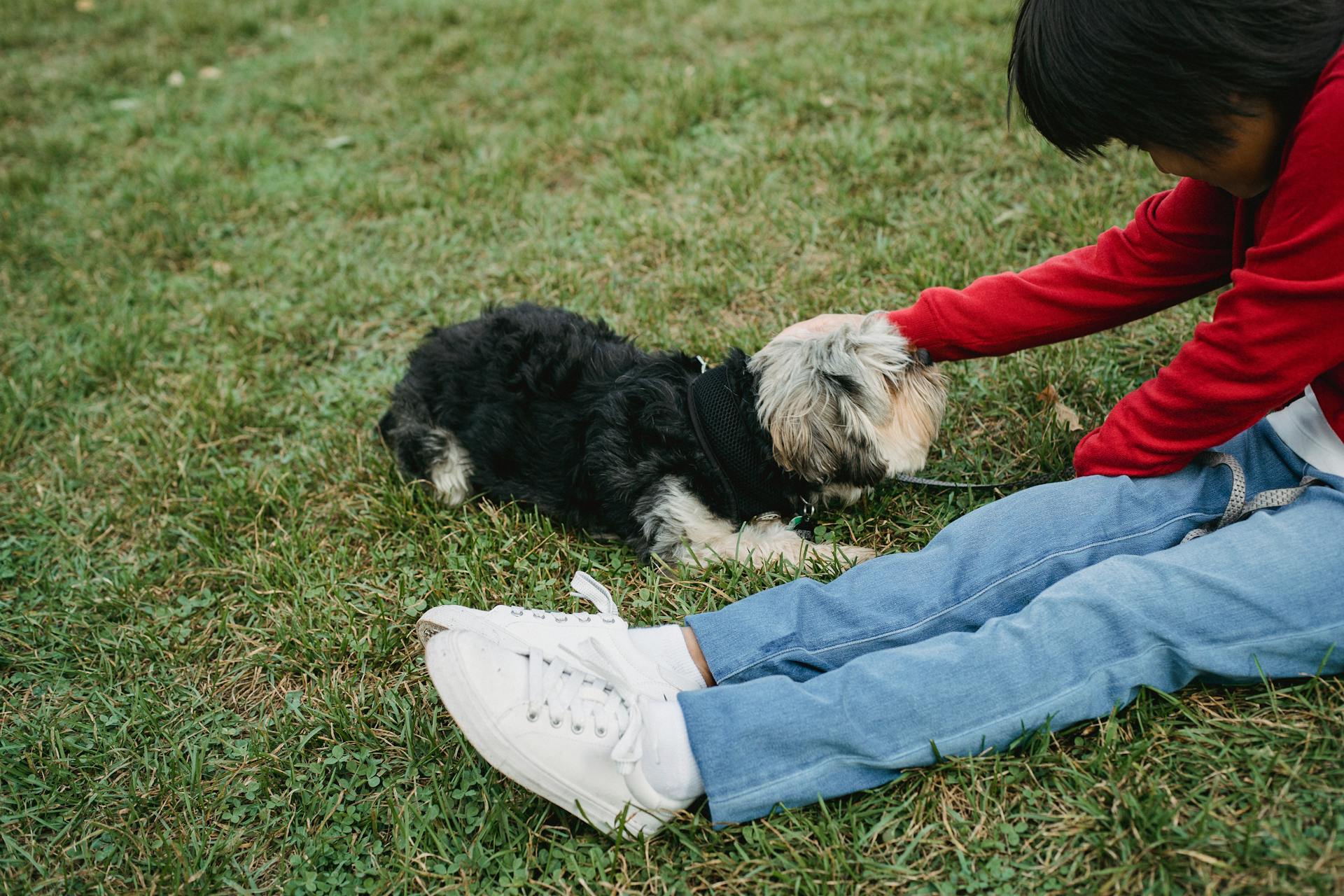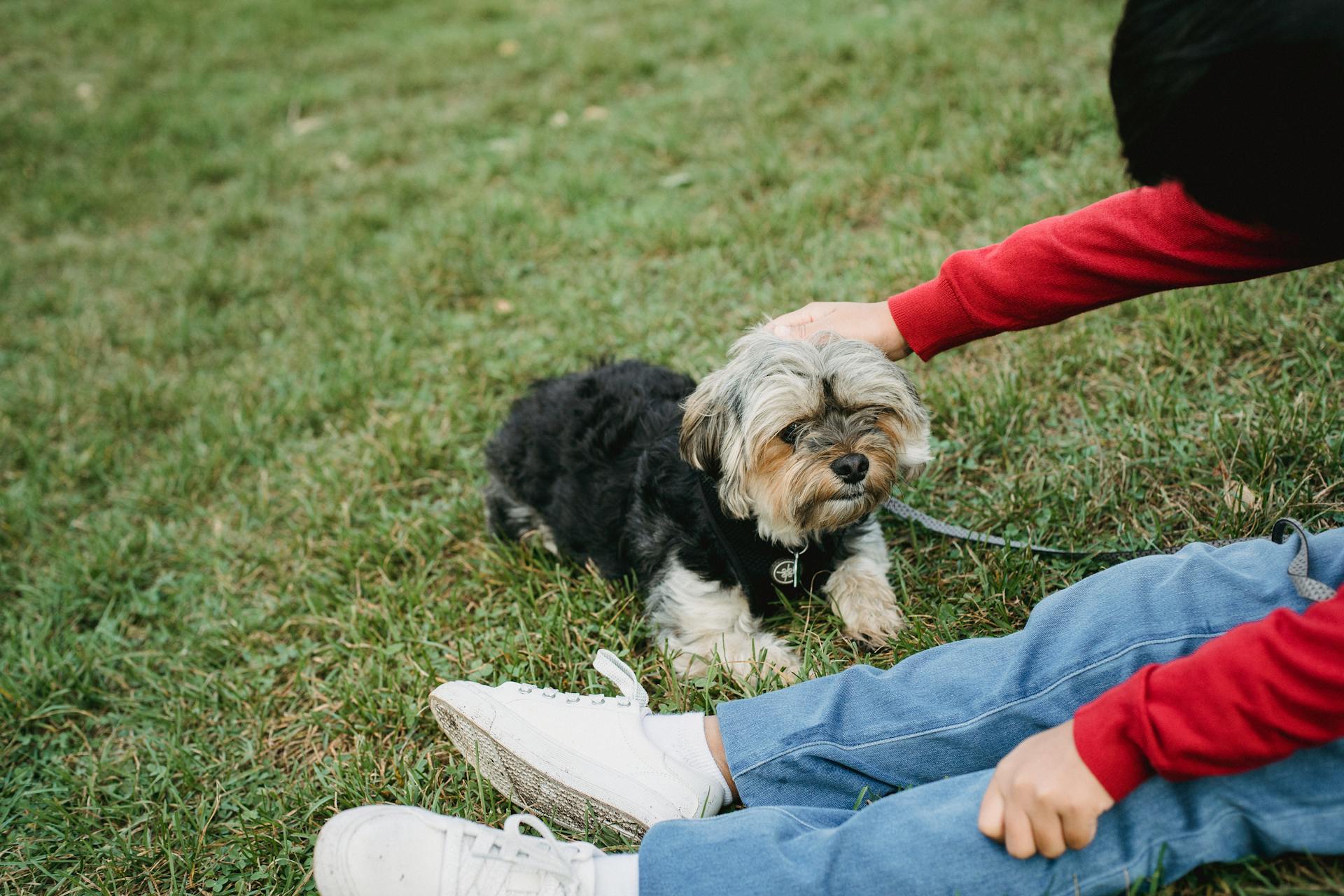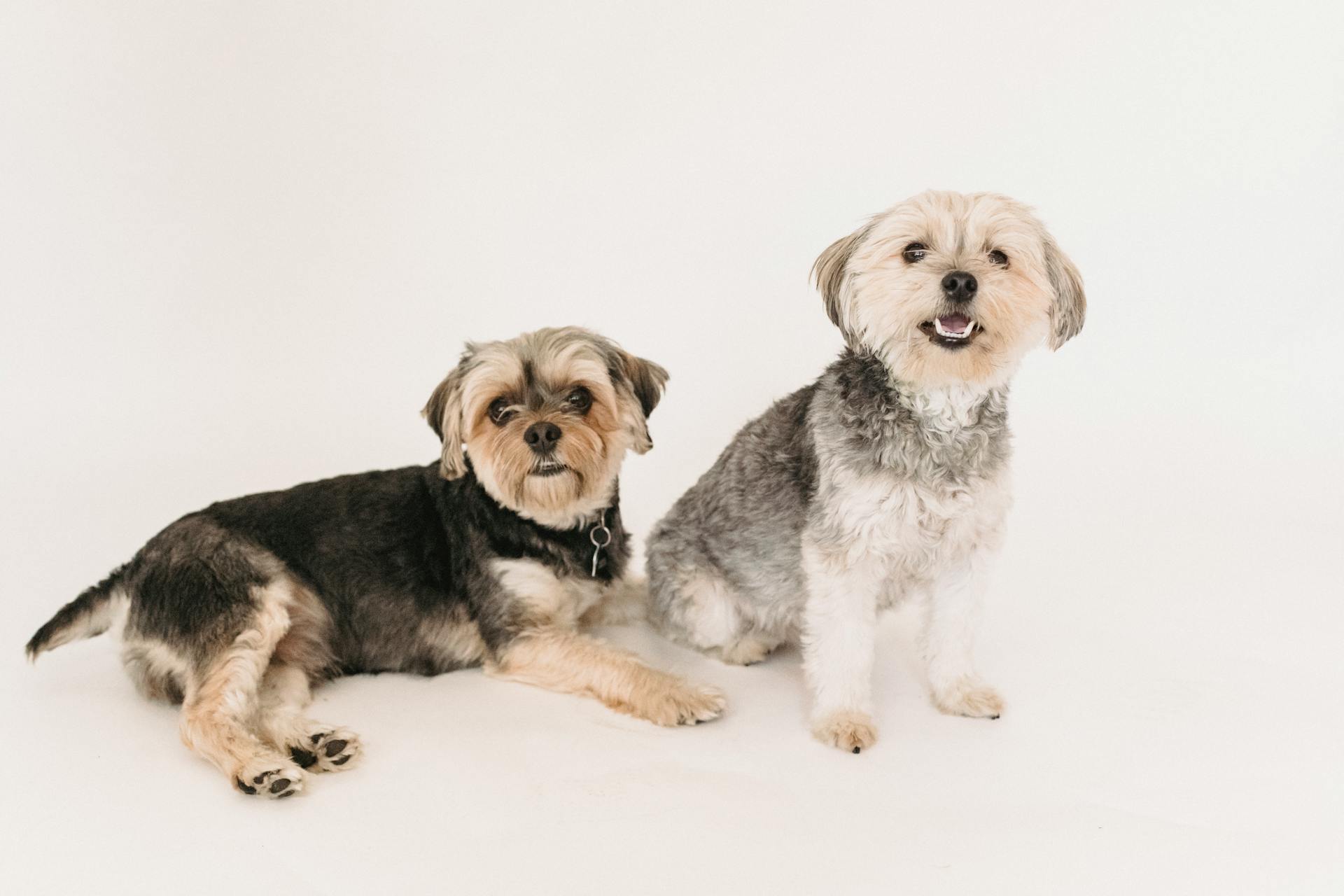
Yorkshire terriers are prone to a condition known as tracheal collapse, where the airway narrows and collapses, leading to coughing.
This condition is often caused by the small size of their trachea, which is more susceptible to collapse than larger dogs.
A Yorkshire terrier's trachea is made up of cartilage rings that provide support, but in small breeds like Yorkies, these rings can be weaker and more prone to collapse.
Yorkies are also more likely to experience tracheal collapse due to their long, narrow necks, which can put pressure on the trachea.
Discover more: Small Yorkshire Terrier
Causes and Diagnosis
A collapsing trachea is a serious condition that can cause a Yorkshire terrier to cough. Very light pressure on the trachea can cause coughing or breathing difficulty, which may raise suspicion of tracheal collapse.
To confirm the diagnosis, tests such as radiographs (X-rays), fluoroscopy (dynamic x-ray), or the use of an endoscope or bronchoscope are needed. These tests can provide a clear picture of the trachea's condition and help determine the best course of treatment.
Diagnostic Testing

Diagnostic testing is a crucial step in confirming a tracheal collapse diagnosis. Very light pressure on the trachea during a physical exam can raise suspicion of tracheal collapse if it causes coughing or breathing difficulty.
A physical exam is often the first step in diagnosing tracheal collapse. History taking and physical examination are essential for diagnosing mild tracheal collapse.
Radiographs (X-rays), fluoroscopy (dynamic x-ray), and the use of an endoscope or bronchoscope are needed to confirm the diagnosis in some cases. These tests can provide more detailed information about the trachea and help confirm the diagnosis.
Moderate to severely affected patients may require additional diagnostics beyond history taking and physical examination.
Worth a look: What Were Yorkshire Terriers Used for
Identifying
Identifying the signs of tracheal collapse can be a bit tricky, but there are some key indicators to look out for. A persistent, dry, harsh cough is the most common clinical sign, often described as a 'goose honk' cough.
This cough can worsen at night, with excitement, or with pressure on the trachea, such as from a collar. It can also be triggered by hot or humid weather, or immediately after eating or drinking.

A veterinarian may suspect tracheal collapse during a physical exam if they notice that very light pressure on the trachea causes coughing or breathing difficulty. Tests such as radiographs, fluoroscopy, or the use of an endoscope or bronchoscope are needed to confirm the diagnosis.
Small and toy breed dogs, like Pomeranians, Yorkshire Terriers, Poodles, and Chihuahuas, are more commonly affected, especially as they age.
Treatment Options
For Yorkshire Terriers with a persistent and/or severe cough, the goal is to limit the progression of the disease and control clinical signs to improve the patient's quality of life.
Cough suppressants can be given as needed to control the cough, with the dose tapered to the lowest amount needed.
Hydrocodone has been the most widely used cough suppressant and is very effective, although availability can be limited.
Butorphanol is also an effective cough suppressant and may be available with a veterinary label.
Oral steroids, such as prednisolone and fluticasone, can decrease inflammation and help decrease associated cough, particularly in dogs with tracheal collapse.
Glucocorticoids tend to promote weight gain and should be tapered to the lowest effective dose.
Using a harness instead of a collar can help reduce pressure on the dog's neck, which may help alleviate respiratory distress.
Maropitant, a neurokinin-1 receptor antagonist, has reportedly been successful for treating tracheal collapse, and may be worth discussing with your veterinarian.
Antibiotics may be necessary if secondary infection develops, and ideally should be based on bacterial culture and sensitivity testing or PCR.
Support and Management
Weight management is crucial for obese Yorkshire Terriers to diminish respiratory strain. A significant reduction in cough can be achieved by helping your dog lose weight, which is especially important if your Yorkshire Terrier is overweight.
Reducing stress and avoiding irritants can also mitigate symptoms. This means keeping your Yorkshire Terrier calm and away from things that might trigger coughing.
Incorporating controlled leash walking can contribute to both weight control and stress alleviation. This is especially important for Yorkshire Terriers with tracheal collapse, as it can help alleviate respiratory strain.
For another approach, see: Average Yorkshire Terrier Weight
Support Procedures

Weight management is crucial for obese dogs with tracheal collapse to diminish respiratory strain. Losing weight can decrease cough in overweight dogs.
Reducing stress can help alleviate symptoms of tracheal collapse. Overexcitement can worsen respiratory distress and may lead to further progression.
Switching from a collar to a harness can also mitigate symptoms. Using harnesses instead of collars is not clearly beneficial in preventing progression of collapse, but it's a good idea not to put additional pressure on the dog's neck.
Incorporating controlled leash walking can contribute to both weight control and stress alleviation. This is especially beneficial for dogs with tracheal collapse who may experience respiratory strain.
Avoiding irritants can also help alleviate symptoms. Good air quality and a stress-free environment can make a big difference for dogs with tracheal collapse.
For another approach, see: Is a Yorkie a Good Family Dog
Surgical Management
Surgical Management can be a complex topic for dog owners who are considering it for their pets with tracheal collapse. Over 5 million hits on Google bring up information on trachea surgery in dogs, and many Facebook groups discuss surgical intervention.

A key thing to consider is that surgery may not necessarily decrease coughing in dogs with tracheal collapse. In fact, clients are often disappointed by surgical outcomes if coughing is their primary concern.
For dogs with severe clinical signs, trachea surgery may be considered palliative. This means that the surgery aims to relieve symptoms rather than cure the condition.
Determining the primary location of the collapsed region or if multiple segments are affected is crucial in deciding whether surgical palliation should be attempted. This helps clinicians determine the best course of action for the dog.
There are two options for surgical management: placement of tracheal rings or an intraluminal tracheal stent. These options can help relieve symptoms and improve the dog's quality of life.
It's essential to educate clients that no current option returns the trachea to normal. This means that surgery is not a cure-all, but rather a way to manage symptoms and improve the dog's comfort.
Referral for discussion of surgical therapy early rather than late is often recommended for moderately to severely affected patients. This allows clinicians to discuss the options and determine the best course of action for the dog.
A different take: How Often Should You Bathe a Yorkshire Terrier
Frequently Asked Questions
What to give a Yorkie for a cough?
For a Yorkie with a cough, consider giving Manuka honey to help relieve symptoms due to its antioxidant and anti-inflammatory properties. However, consult with a veterinarian first to determine the best dosage and treatment plan for your dog.
Sources
- https://todaysveterinarypractice.com/respiratory-medicine/tracheal-collapse/
- https://yorkiehq.com/why-is-my-yorkie-coughing/
- https://vcahospitals.com/know-your-pet/tracheal-collapse-in-dogs
- https://www.vetspecialists.co.uk/fact-sheets-post/tracheal-collapse-fact-sheet/
- https://www.trudellanimalhealth.com/learn/further-reading/tracheal-collapse-dogs-what-it-symptoms-look-and-how-treat-it
Featured Images: pexels.com


